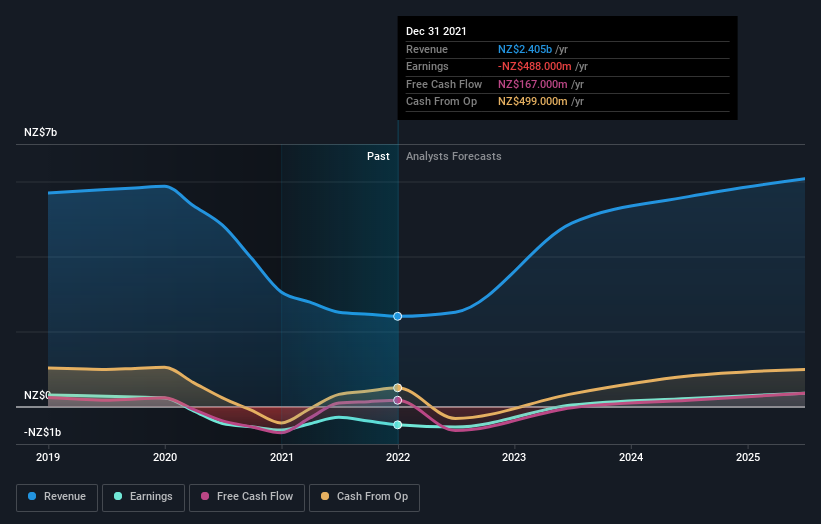Shareholders in Air New Zealand (NZSE:AIR) are in the red if they invested five years ago
Generally speaking long term investing is the way to go. But no-one is immune from buying too high. To wit, the Air New Zealand Limited (NZSE:AIR) share price managed to fall 82% over five long years. We certainly feel for shareholders who bought near the top. And it's not just long term holders hurting, because the stock is down 60% in the last year. Shareholders have had an even rougher run lately, with the share price down 32% in the last 90 days. While a drop like that is definitely a body blow, money isn't as important as health and happiness.
So let's have a look and see if the longer term performance of the company has been in line with the underlying business' progress.
See our latest analysis for Air New Zealand
Given that Air New Zealand didn't make a profit in the last twelve months, we'll focus on revenue growth to form a quick view of its business development. Generally speaking, companies without profits are expected to grow revenue every year, and at a good clip. As you can imagine, fast revenue growth, when maintained, often leads to fast profit growth.
In the last five years Air New Zealand saw its revenue shrink by 12% per year. That's definitely a weaker result than most pre-profit companies report. So it's not that strange that the share price dropped 13% per year in that period. This kind of price performance makes us very wary, especially when combined with falling revenue. Of course, the poor performance could mean the market has been too severe selling down. That can happen.
The company's revenue and earnings (over time) are depicted in the image below (click to see the exact numbers).
It's good to see that there was some significant insider buying in the last three months. That's a positive. On the other hand, we think the revenue and earnings trends are much more meaningful measures of the business. You can see what analysts are predicting for Air New Zealand in this interactive graph of future profit estimates.
What About The Total Shareholder Return (TSR)?
We've already covered Air New Zealand's share price action, but we should also mention its total shareholder return (TSR). Arguably the TSR is a more complete return calculation because it accounts for the value of dividends (as if they were reinvested), along with the hypothetical value of any discounted capital that have been offered to shareholders. Dividends have been really beneficial for Air New Zealand shareholders, and that cash payout explains why its total shareholder loss of 64%, over the last 5 years, isn't as bad as the share price return.
A Different Perspective
We regret to report that Air New Zealand shareholders are down 35% for the year. Unfortunately, that's worse than the broader market decline of 11%. Having said that, it's inevitable that some stocks will be oversold in a falling market. The key is to keep your eyes on the fundamental developments. Regrettably, last year's performance caps off a bad run, with the shareholders facing a total loss of 10% per year over five years. Generally speaking long term share price weakness can be a bad sign, though contrarian investors might want to research the stock in hope of a turnaround. While it is well worth considering the different impacts that market conditions can have on the share price, there are other factors that are even more important. To that end, you should learn about the 2 warning signs we've spotted with Air New Zealand (including 1 which is a bit concerning) .
Air New Zealand is not the only stock insiders are buying. So take a peek at this free list of growing companies with insider buying.
Please note, the market returns quoted in this article reflect the market weighted average returns of stocks that currently trade on NZ exchanges.
Have feedback on this article? Concerned about the content? Get in touch with us directly. Alternatively, email editorial-team (at) simplywallst.com.
This article by Simply Wall St is general in nature. We provide commentary based on historical data and analyst forecasts only using an unbiased methodology and our articles are not intended to be financial advice. It does not constitute a recommendation to buy or sell any stock, and does not take account of your objectives, or your financial situation. We aim to bring you long-term focused analysis driven by fundamental data. Note that our analysis may not factor in the latest price-sensitive company announcements or qualitative material. Simply Wall St has no position in any stocks mentioned.
Join A Paid User Research Session
You’ll receive a US$30 Amazon Gift card for 1 hour of your time while helping us build better investing tools for the individual investors like yourself. Sign up here


